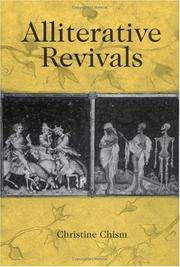| Listing 1 - 5 of 5 |
Sort by
|

ISBN: 0812236556 1322510547 0812201582 0585436215 Year: 2002 Publisher: Philadelphia : University of Pennsylvania Press,
Abstract | Keywords | Export | Availability | Bookmark
 Loading...
Loading...Choose an application
- Reference Manager
- EndNote
- RefWorks (Direct export to RefWorks)
Alliterative Revivals is the first full-length study of the sophisticated historical consciousness of late medieval alliterative romance. Drawing from historicism, feminism, performance studies, and postcolonial theory, Christine Chism argues that these poems animate British history by reviving and acknowledging potentially threatening figures from the medieval past-pagan judges, primeval giants, Greek knights, Jewish forefathers, Egyptian sorcerers, and dead ancestors. In addressing the ways alliterative poems centralize history-the dangerous but profitable commerce of the present with the past-Chism's book shifts the emphasis from the philological questions that have preoccupied studies of alliterative romance and offers a new argument about the uses of alliterative poetry, how it appealed to its original producers and audiences, and why it deserves attention now. Alliterative Revivals examines eight poems: St. Erkenwald, Sir Gawain and the Green Knight, The Wars of Alexander, The Siege of Jerusalem, the alliterative Morte Arthure, De Tribus Regibus Mortuis, The Awntyrs off Arthure, and Somer Sunday. Chism both historicizes these texts and argues that they are themselves obsessed with history, dramatizing encounters between the ancient past and the medieval present as a way for fourteenth-century contemporaries to examine and rethink a range of ideologies.These poems project contemporary conflicts into vivid, vast, and spectacular historical theaters in order to reimagine the complex relations between monarchy and nobility, ecclesiastical authority and lay piety, courtly and provincial culture, western Christendom and its easterly others, and the living and their dead progenitors. In this, alliterative romance joins hands with other late fourteenth-century literary texts that make trouble at the borders of aristocratic culture.
English poetry --- Middle English, 1100-1500 --- History and criticism --- Alliteration --- Alliteration. --- Rhyme --- Versification --- History and criticism. --- Cultural Studies. --- Literature. --- Medieval and Renaissance Studies.
Book
ISBN: 9780812201581 Year: 2013 Publisher: Philadelphia
Abstract | Keywords | Export | Availability | Bookmark
 Loading...
Loading...Choose an application
- Reference Manager
- EndNote
- RefWorks (Direct export to RefWorks)
Digital
ISBN: 9780812201581 9780812236552 Year: 2013 Publisher: Philadelphia, Pa University of Pennsylvania Press
Abstract | Keywords | Export | Availability | Bookmark
 Loading...
Loading...Choose an application
- Reference Manager
- EndNote
- RefWorks (Direct export to RefWorks)
Book

ISBN: 3110465701 3110467305 9783110467307 9783110465709 9783110465464 3110465469 Year: 2016 Publisher: Berlin Boston
Abstract | Keywords | Export | Availability | Bookmark
 Loading...
Loading...Choose an application
- Reference Manager
- EndNote
- RefWorks (Direct export to RefWorks)
Understanding how medieval textual cultures engaged with the heritage of antiquity (transmission and translation) depends on recognizing that reception is a creative cultural act (transformation). These essays focus on the people, societies and institutions who were doing the transmitting, translating, and transforming -- the "agents". The subject matter ranges from medicine to astronomy, literature to magic, while the cultural context encompasses Islamic and Jewish societies, as well as Byzantium and the Latin West. What unites these studies is their attention to the methodological and conceptual challenges of thinking about agency. Not every agent acted with an agenda, and agenda were sometimes driven by immediate needs or religious considerations that while compelling to the actors, are more opaque to us. What does it mean to say that a text becomes “available” for transmission or translation? And why do some texts, once transmitted, fail to thrive in their new milieu? This collection thus points toward a more sophisticated “ecology” of transmission, where not only individuals and teams of individuals, but also social spaces and local cultures, act as the agents of cultural creativity.
Civilization, Medieval. --- Middle Ages. --- Dark Ages --- History, Medieval --- Medieval history --- Medieval period --- Middle Ages --- World history, Medieval --- World history --- Civilization, Medieval --- Medievalism --- Renaissance --- Medieval civilization --- Civilization --- Chivalry --- History --- Classics. --- Medieval. --- Textuality. --- Transmission.
Digital

ISBN: 9783110467307 9783110465709 9783110465464 Year: 2016 Publisher: Berlin ;; Boston De Gruyter
Abstract | Keywords | Export | Availability | Bookmark
 Loading...
Loading...Choose an application
- Reference Manager
- EndNote
- RefWorks (Direct export to RefWorks)
| Listing 1 - 5 of 5 |
Sort by
|

 Search
Search Feedback
Feedback About UniCat
About UniCat  Help
Help News
News